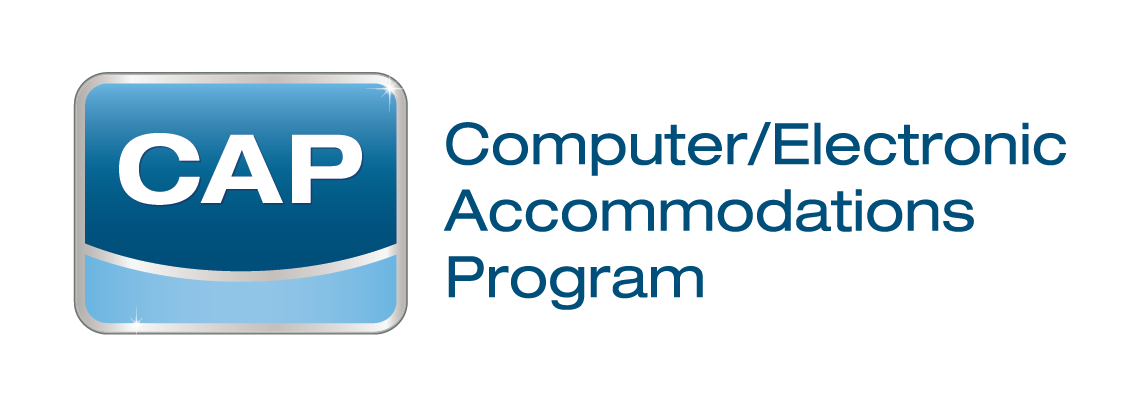DoD Section 501 Advancing Employment Support Services
CAP is strengthening partnerships with Federal agencies to build programmatic and technical expertise. We are working to eliminate the gaps in providing Employment Support Services. CAP is actively working with our Federal partners to ensure DoD civilian employees with disabilities receive assistive technology and employment support services. CAP experts conduct Workplace Disability Needs Assessments to ensure individuals receive support for accommodations including complex employment support services (ASL Interpreters, Readers, Communication Access Realtime Translation services, Scripting/Captioning, Training, Personal Assistant Services, and others).
AMERICAN SIGN LANGUAGE INTERPRETING SERVICES
Interpreting is a form of communication where an interpreter uses American Sign Language (ASL) and English to receptively and expressively convey accurate, effective, and impartial communication between Deaf, hard of hearing, and hearing individuals. CAP provides interpreting, oral interpreting, and tactile interpreting services for Department of Defense (DoD) employees who are Deaf or hard of hearing. CAP does have specific requirements in order to provide interpreting services and all requests will be reviewed on a case-by-case basis.
READER SERVICES
Reader services are one of the many services made available under the Americans with Disabilities Act (ADA) which defines a “qualified” Reader as someone who can read effectively, accurately, competently, and impartially, using any necessary specialized vocabulary while following detailed instructions. Reader services is based on a professional relationship established between a Blind or Low Vision individual and a qualified Reader. A Reader is a sighted person who reads aloud directly to the Blind or Low Vision individual. They are flexible and able to adapt to various types of materials to be read. Specific support by a reader occurs in several ways, including the reading of technical papers, emails, manuals, workshop handouts, contracts, and other professional documents. Readers are trained to verbally describe what is displayed on a screen, such as graphs, maps, charts, pictures, and diagrams, where applicable. They are proficient in various computer applications and can assist as needed. CAP can provide Reader Services for Blind or Low Vision individuals and services are provided virtually as well as on-site.
COMMUNICATION ACESS REALTIME TRANSLATION (CART)
Communication Access Realtime Translation (CART) is a professional service for the provision of real-time captioning of spoken information for Deaf or hard of hearing individuals to facilitate their participation in trainings, meetings, or conferences that occur within DoD facilities. CART is described as the instant translation of the spoken word into English text using a stenotype machine, notebook computer and real-time software. CAP can provide CART services which can be delivered in-person, or remotely via phone, VTC, or another video/screensharing program.
VIDEO/MEDIA TRANSCRIPTION
Video and media transcription and captioning supports the efforts of the DoD and our federal partners to be Section 508 compliant ensuring programs and activities are accessible to individuals with disabilities including members of the public. CAP can support the procurement of technology that equips DoD facilities with the assistive technology critical for effective and meaningful communication. For example, CAP can provide fully automated, broadcast compliant closed captioning technology for live broadcasts, streaming content, or post-production ensuring videos meet or exceed compliance requirements to be inclusive and accessible to viewers.
TRAINING (Advisors and Subject Matter Experts)
CAP provides training, both online and virtually, on CAP services as they relate to disability program management. CAP supports the efforts of our federal partners to ensure agency hosted and sponsored events, programs, and materials are accessible to individuals with disabilities. CAP can assist by providing interpreting, Communication Access Real-time Translation (CART), or captioning and transcription services. Through these actions, CAP supports the compliance of a variety of federal disability laws, rules, and regulations. CAP also assists in identifying the most appropriate accommodations via workplace needs assessments and technology demonstrations. For individuals who have had their disabling condition for all or most of their lives, they can identify their own appropriate accommodations. However, some individuals may have newly acquired limitations, or may be performing different duties in a new location. They may realize they need better tools but may not know what is available. The needs assessment process helps address that need.
PERSONAL ASSISTANCE SERVICES (PAS)
Personal Assistance Services (PAS) is an employment support service that enables individuals with [targeted] disabilities to travel and attend important work-related trainings and events and enables the individual to perform the essential functions of their job. In compliance with Section 501 of the Rehabilitation Act, PAS provides assistance with performing activities of daily living that an individual would typically perform if they did not have a disability, and that is not otherwise required as a reasonable accommodation, including, but not limited to, assistance with removing and putting on clothing, eating, and using the restroom. Such services do not include medical care. PAS is not the same as reasonable accommodations that support employees in performing job-related tasks, such as sign language interpreters for employees who are Deaf or hard of hearing, or readers for employees who are blind, low vision, or have learning disabilities. The training and skills that a PAS provider should have will depend on the specific services needed by the individual.


